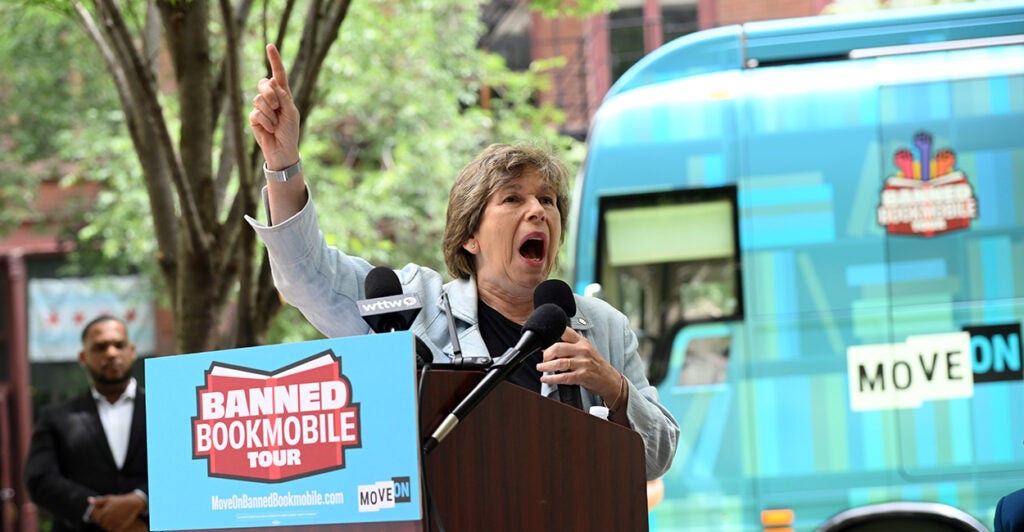Randi Weingarten, president of America’s second-largest teachers union, didn’t even wait for Banned Books Week to begin before posting on X: “Texas teacher fired for reading Diary of Anne Frank to class—THIS Speaks for itself!!!”
Just the latest example of “book banning” in our schools, it seemed.
But like almost every other aspect of overwrought book-banning claims, the description of this example is distorted. The book in question was not Anne Frank’s classic “Diary of a Young Girl,” but an adaptation of that work, a graphic novel called “Anne Frank’s Diary” that emphasizes and inflates sexual passages in the original diary.
Specifically, the teacher asked her eighth grade students to read aloud and discuss a sexually explicit passage from that adaptation, in which Frank asks her friend if they could “show each other our breasts” and expresses a “terrible desire to kiss her.” So, what was billed by the avatar of the American education establishment as a proto-fascist incident was just parents reacting to a teacher’s choice to emphasize sex in the Anne Frank story.
This, more or less, is what has been happening for years now in America’s contrived—and, frankly, perverted—debate over “book bans.”
School librarians decide to stock sexually explicit books, frequently far more obscene than the passage above. Parents object to the presence of pornographic material in their children’s school libraries. And then the American education establishment and media try to tar them as “book banners,” suggesting they are racists, transphobes, and akin to Nazis.
The entire conversation on “book banning” has taken place under a false definition promulgated by PEN America, a left-wing advocacy group that purports to monitor an unprecedented spike in “bans.” But it defines “ban” so expansively as to render that term meaningless.
If a book has been temporarily removed, reviewed, and then returned to the shelves, it has been banned, according to PEN. If a school places a parental permission requirement on a book, it has been banned, according to PEN. If a school moves a book to a guidance counselor’s office, it has been banned, according to PEN.
A school in Miami made international news when it supposedly banned the poem by Amanda Gorman that she read at President Joe Biden’s inauguration. What really happened: The K-8 school moved the poem from the elementary to the middle school section of the same library.
Given that most English-language speakers understand the word “ban” to mean “made unavailable,” we conducted a study to determine how many of the 2,532 books that PEN America alleged were banned were actually still present in school libraries. The answer: about three-fourths of them.
The media has fabricated the narrative that book bans are about race. We found that while some parents have certainly objected to books about race, school districts seldom oblige that objection. For example, PEN America listed the Black Lives Matter-inspired “The Hate U Give” as the fifth-most banned book. We found it available in every single school library in question.
The media has also fabricated the narrative that book bans are about LGBTQ identity. But, as The Washington Post documented, only 7% of parental objections included “LGBTQ” without also including the word “sexual.”
All 10 of the books we found that were actually removed most often contained disturbingly explicit passages about sex. Take, for example, the most-banned, “Gender Queer.” That graphic novel features a picture of oral sex being performed on a sex toy. It also contains an X-rated passage.
Lest you think we’re cherry-picking, consider the other top 10 most-removed books.
“This Book Is Gay” provides a how-to guide to find strangers for sex on gay sex apps. “Out of Darkness” contains a rape. “l8r g8r” contains discussions of oral sex. “All Boys Aren’t Blue” contains underage incest. “It’s Perfectly Normal” contains drawings of children masturbating. “Lawn Boy” contains a passage about 10-year-old boys performing oral sex on each other. “Jack of Hearts” talks about a condom that is “covered in s—-.” “Crank” details a meth-fueled rape. “Lucky” also details a rape. And “A Court of Mist and Fury,” tame by comparison, contains an extremely explicit sexual passage.
The true significance of so-called book bans is not some resurgent racist or fascist impulse exhibited by a faction of American parents. It’s the profound moral disconnect between the 90% of Americans who believe that sexually obscene material does not belong in school libraries and an education establishment broadly convinced that it’s good, necessary, and “inclusive” to show children explicit images of sexual acts.
This piece originally appeared in The Washington Times.
Have an opinion about this article? To sound off, please email letters@DailySignal.com, and we’ll consider publishing your edited remarks in our regular “We Hear You” feature. Remember to include the URL or headline of the article plus your name and town and/or state.
